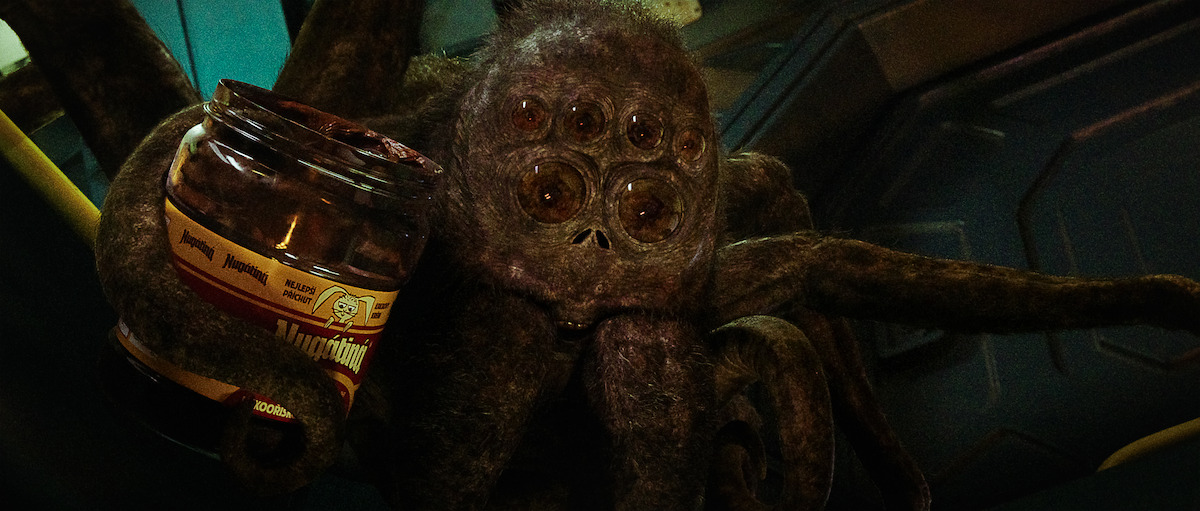
I’ve been wanting to do this type of analysis for quite a long time, but I’ve never got around to it, but it has been a long-time goal for me to do this type of thing for this site. I recently watched Netflix’s latest movie starring Adam Sandler in Spaceman. I was intrigued by the philosophical call backs and Jungian symbolism evident in the film and what it means to the viewer on both a conscious and a subconscious level and thought I’d do my best to explain it in a lay person’s sort of way in which Pre-Socratic philosophy meets with the work of the Swiss Psychoanalyst Carl Jung.
So, buckle up folks, what we’re about to discuss, does include spoilers, so if you want to watch the movie but don’t want it ruined in advance by myself then please click away, select another video to watch and then come back to this one once you’ve watched the movie.
If you are still here after this point, you’ve only got yourself to blame. Netflix’s Spaceman follows the fictional story of Jakub Procházka, (forgive me, I’m not very good at Czech) the first independent Czech cosmonaut.
The blurb from Netflix reads: Six months into a solitary research mission to the edge of the solar system, an astronaut, Jakub (Adam Sandler), realises that the marriage he left behind might not be waiting for him when he returns to Earth. Desperate to fix things with his wife, Lenka (Carey Mulligan), he is helped by a mysterious creature from the beginning of time he finds hiding in the bowels of his ship. Hanuš (voiced by Paul Dano) works with Jakub to make sense of what went wrong before it is too late. Directed by Johan Renck and based on the novel Spaceman of Bohemia, the film also stars Kunal Nayyar, Lena Olin, and Isabella Rossellini.
Jakub (Adam Sandler) is sent on an eight-month-long solo mission to investigate and retrieve samples of an irregular space cloud that has appeared in the skies above Earth but is in actuality situated just beyond the orbit of Jupiter, the cloud has been for reasons that are not evident named “Chopra”. Probably because it was detected by Indian astronomers, I would presume.
Picking up six months into the mission, Jakub is depressed and lonely after his wife, Lenka played convincingly by Carey Mulligan, stops answering his calls. In this fictional universe they are able to communicate with audio and visual in real time via through the use of a quantum phone regardless of distance. Lenka is heavily pregnant and as equally depressed and lonely as Jakub and decides that she is going to leave him. She takes the view that he put the mission first, he put his own needs first over and above the needs of her and their unborn child and that he has continually done so throughout their relationship despite promising her that they would be together all of the time. Lenka pre-records a message for him in which she explains to Jakub her decision but mission control refuses to send it as they fear the additional strain it will inflict on Jakub’s already fragile mental state. Alone in the cosmos and cut off from the woman he loves he is for want of a better term, falling apart, just as the mission is entering its most crucial phase.
Jakub is often shown sleeping and dreaming, then he has a nightmare in which a spider crawls under his skin and out of his mouth, sometime later he hears a calm, soothing and hypnotic voice in his head telling him not to be afraid, as a giant arachnid makes an appearance on the ship. The otherworldly spider says it is there as a researcher, gathering information about humans, having fled its home after the parasitic Gorompeds annihilated its species.
Understandably enough, Jakub doubts his sanity as panic grips him and he flees into the airlock before donning a spacesuit, asking mission control urgently if they can see something on the many cameras within the ship which have recently had a history of failure. Trapped inside the airlock, Jakub attempts to kill the arachnid with a decontaminate bomb but to no avail which makes the viewer wonder if the creature is actually real or just a figment of Jakub’s imagination, an episode of space psychosis. This question remains unanswered for the rest of the movie.
“The collective unconscious consists of the sum of the instincts and their correlates, the archetypes. Just as everybody possesses instincts, so he also possesses a stock of archetypal images. Carl Jung”
The spider offers to help Jakub with his loneliness and his suffering as he is able to enter his memories and sift through them reliving them with Jakub. These include childhood memories, such as his father’s death at the hands of a vengeful mob for being a communist informant during the times of Soviet governance and later memories of meeting Lenka. Through the spider’s probing, it’s revealed that Jakub has been so focused on succeeding as an astronaut in an attempt to clear his family name, which was disgraced by his father being an informant for the previous regime. This selfish goal (albeit an unconscious one) led Jakub to neglect his marriage. Thus, the reason for Jakub’s voyage is to redeem the spirit of his father whom Jacob considers to have been a good man who was on the wrong side of history. Thus in Jungian terms Jakub is a sailor on a voyage into the underworld in order to resurrect the spirit of his father.
Eventually, Jakub forms a bond with his new companion, naming it Hanuš who gently makes Jakub realise his own mistakes, that he been terribly selfish and blind towards the needs of his wife and their unborn child. In Jungian terms Hanuš is symbolic of Jakub’s conscience, and becomes his internal critic, the spider is a monstrous archetype that holds multifaceted symbolism, reflecting various aspects of the human psyche.
The dream or vision in which a spider crawls out of Jakubs mouth is easily symbolic of Hanuš being birthed from Jakub’s subconscious. We should be mindful that Jung once said that there is “no birth to consciousness without pain.” And “Until you make the unconscious conscious, it will direct your life and you will call it fate.” – Carl Jung
In other words, the conscious mind rides like an ant on the back of an elephant. It foolishly thinks that it directs the beast, but in actual fact, spends the bulk of its time rationalising and acting upon subconscious desires and dictates. In Jungian analysis there are several interpretations of what the spider archetype may symbolise:
- Creativity and Weaving – Like a spider spins its web, the spider archetype symbolises the creative process of weaving together various elements of one’s life or psyche to create something new. This could include the weaving of thoughts, emotions, and experiences to form a coherent narrative or artistic expression.
- Feminine Power and Wisdom -In many cultures, the spider is associated with femininity and the feminine aspect of the psyche. It embodies qualities such as patience, nurturing, and intuition. The spider archetype can symbolise the inner wisdom and power that is often associated with the feminine principle. All of which is possessed in abundance by Hanuš.
- Shadow and Trickster – On the flip side, the spider archetype can also represent the shadow aspects of the psyche. It may symbolise manipulation, deceit, and the tendency to ensnare others in one’s web of lies or illusions. In this sense, the spider archetype can serve as a reminder to confront and integrate our own shadow aspects, all of which is essential if we wish to become a complete person and live authentically true to our own being, moving to the beat of our own drum so to speak.
- Complexity and Connectivity – Spiders create intricate webs that serve as both traps for prey and homes for themselves. This complexity and connectivity can symbolise the interconnectedness of all things in the universe, as well as the intricate network of relationships and experiences that make up the human experience.
- Transformation and Renewal – Some interpretations of the spider archetype emphasise its role in transformation and renewal. Like the shedding of its old exoskeleton, the spider symbolises the process of shedding old habits, beliefs, and identities in order to make way for growth and renewal. Overall, the symbolism of the spider archetype in Jungian psychology is rich and multifaceted, encompassing themes of creativity, femininity, shadow, complexity, and transformation. As with all archetypes, its meaning may vary depending on the individual’s personal experiences and cultural context.
The Chopra Cloud – An encounter with truth
The Chopra cloud is a very visible archetype of Truth and its discovery. Falsehoods cannot survive an encounter with the truth which is why it is sought out and valued by human beings universally, leading to most of us thinking that a life dedicated to the discovery of truth, such as a scientist researching a cure for an illness, is a good life to be had.
As the ship gets closer to the Chopra cloud, conflict emerges between Jakub and Hanuš when Jakub refuses to accept that he is responsible for his own pain, the spider leaves Jacub and can no longer be found anywhere on the ship. After some soul searching by Jakub, he returns and the pair unite and later share an embrace when it is revealed that Hanuš doesn’t have much time to live, he will soon be consumed by the Gorompeds. This is symbolic of the man, the ego, the lone observer of reality encountering and making peace with the shadow. He now loves the monster, together they’ve become one being.
With the Gorompeds beginning to consume Hanuš Jakub abandons his ship at the most crucial phase of the mission to save his new friend and manages to buy him some more time in the process, so Hanuš rewards Jakub by taking him deeper into the cloud, which Jakub learns is the beginning and end of all time in the universe. Whilst there he relives more memories as well as having an encounter with an archetypical image of his wife who represents the feminine aspect of his psyche. Jakub then realises that he has to relinquish his selfish ways in order to fulfil his greatest desire and spend the rest of his life with her. Thus, an encounter with the shadow (the spider) in his web (the Chopra cloud) in which Jakub sees for himself all of the invisible strands that make up reality now heals him completely. Hanuš succumbs to the Gorompeds and disappears, consumed by a myriad of small energy beings, leaving Jakub alone yet on a trajectory away from the cloud and towards the Korean ship that has been trailing his craft throughout the entire mission. Jakub is then seen healthy and happy aboard the Korean ship interacting with the crew on the return to earth.
In terms of Jungian psychology, the unborn child represents potential, a new beginning so is symbolic of rebirth, Jakub’s wife Lenka is also symbolic of his feminine side, the anima to his animus as well as the idealised feminine potential, she is often shown dressed as a princess with a crown in the movie (at a fancy dress event), sitting on a log above a river and so on in an elevated position above him. In Jung’s theory, the anima makes up the totality of the unconscious feminine psychological qualities that a man possesses; whilst the animus is representative of the masculine qualities possessed by a woman. The fact that the anima is elevated in this scene reveals it to be a lofty but attainable goal, that is just out of reach but reachable with some effort.
Indeed, the use of Jakub walking through the river multiple times throughout the movie whilst wearing his spacesuit is itself a callback to the presocratic philosopher Heraclitus who once stated, ‘that no man can stand in the same river twice, for it’s not the same river and he’s not the same man.’ Indeed, it was my first encounter with this particular scene that piqued my interest and led to this analysis.
In terms of Jungian analysis both masculine and feminine aspects of the psyche should be integrated into one other, it’s an essential step on the road to completeness and authentic living. You cannot become whole and individualise fully as a person unless you’ve encountered and integrated the shadow and then integrated your anima or animus as appropriate.
Who is real?
One of the major questions posed by the film is whether Hanuš is real or just an episode of psychosis (this is when the contents of the unconscious mind breaks into the personal consciousness of the individual in an unbidden manner).
When asked if the creature is real, Hanuš assures the astronaut “I am as real as you are.” And this is important, the mind models reality for us from sensory data, we only exist as beings within the mind, we can’t experience reality directly we only can only experience the model of it that is created for us within the brain. A dream or an encounter with a being that is not there can be very convincing (just ask any schizophrenic) because they occupy a spot within the model of reality that is presented to the psyche by the brain. There’s no difference as far as the psyche is concerned between waking reality and a sleeping or psychotic one. If someone sees a ghost, but you can’t, it just means that it isn’t present in your model of reality. The contents of your mind, subconscious included, are as real as you are.
There’s something else that is also worth considering and that is that Jakub is the only one to acknowledge Hanuš existence throughout the movie. The spider manages to avoid all detection on the cameras and sensors throughout the ship and Jakub’s attempts to kill the arachnid with a decontaminate bomb fail (when they first meet), insinuating maybe there was nothing to purge in the first place.
In short this is a retelling of a very old story, a sailor, sets out on a voyage to a distant island, along the way he encounters a sea monster who at first frightens him but brings him wisdom, together they reach the island, and a discovery is made, the monster leaves him behind or otherwise is vanquished and the sailor returns home a changed man, a better man, more complete in his nature having learned something important himself and what truly matters in life.
Spaceman is now streaming on Netflix, well worth a watch and personally I give it 5 stars!
“Dreams are the guiding words of the soul. Why should I henceforth not love my dreams and not make their riddling images into objects of my daily consideration? – Carl Jung”

